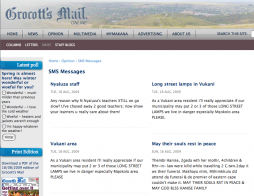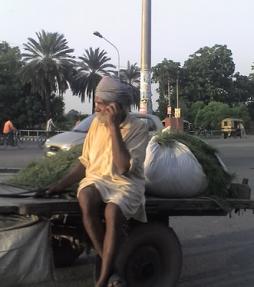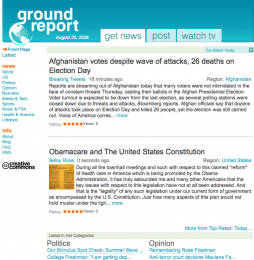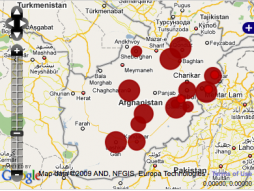As I've mentioned, the Mobile Media Toolkit team will be attending the upcoming Highway Africa conference.
We are excited to meet up with Harry Dugmore and Guy Berger at Rhodes University who have been behind the Lindaba Ziyafika ("The News is Coming") project. The project, motivated by a desire to reach young people in Grahamstown, has taken Grahamstown's newspaper and enabled it for mobile-based citizen contributions.
The pre-cursors to mobile phones were walkie-talkies, and the first generation of mobile phone networks only supported voice communications. With second generation networks and a happy accident came SMS, and only with the third generation networks came mobile data services in the form of GPRS.
Most applications using mobile phones these days tend to use these newer channels of communication—SMS and data. But even though we sometimes forget, voice is still a part of mobile phone communications. This article profiles interesting ways in which voice technology is being used for social work all around the world.
We are excited to attend Highway Africa 2009 and the Digital Citizen Indaba 4.0. The theme is "Reporting Africa - 2010; Developement and Democracy," and the lineup of workshops and debates includes topics such as Freedom of Expression in Cyberspace: Secure Communications, Using Twitter as a Source for Journalists, and Mobile Technology as Source of Revenue for Media Business. (Full program here) DCI, which will be held right before Highway Africa is featuring workshops on Bringing down the Barriers with Interactive Audio Programming and Mobile Phones, Civil Society Use of Mapping Tools and Mass Media Takeup, and Digital Media and the Right to Language. (Full program here)
Image from Highway Africa Website.
GroundReport.com is a platform for the kind of journalism that has many names: hyperlocal journalism, citizen journalism, wiki journalism. Rachel Sterne's idea is to have a website where anyone can just sign up and submit articles, and become an instant citizen reporter. Submitted content goes through a plagiarism filter and a group of editors will edit before any content goes live.
Based on the number of hits and the ranking of the author, good articles get filtered to the front page, and the hope is that bad articles will stay at bay with bad rankings and scarcely any hits. Contributors are compensated based on article rankings but compensation averages only a few cents.
As smartphones proliferate around the world, we ought to remain cognizant of what information we share on those phones with applications, application developers, advertisers and marketers. Phones are incredibly personal, always on, and always with most of us. As a result, they can reveal sensitive information. In fact, it is time for smartphone users to put pressure on application developers, platform providers, and eventually legislators to protect private and potentially sensitive information.
The Electronic Frontier Foundation recently published a paper on locational privacy. Because smartphones know where we are (using GPS, and if not, using applications such as Google’s My Location service), they can reveal a lot of information about activities, patterns of behaviour, and relationships we have.
Af the Afghani elections are coming up this week, there are a projects focusing on the election and citizen media coverage that we like to note.
First, as Taliban has intensified violence and has threatened to disrupt the elections and "kill those who vote," the Afghani government has called for reporters to avoid coverage of violence so that Afghanis aren't scared away from polling stations. Meanwhile, associations such as the Independent Journalist Association of Afghanistan have refused to take the order and has promised to continue reporting. The ban on reporting is phrased as a "request" in English, and as "strictly forbidden" in Dari (good synopsis of ban and violence here).
The Mobile Media Toolkit would like to point out to journalists working everywhere of a few funding opportunities and competitions that are coming up.
As we explore the role of mobile media for the Mobile Media Toolkit project, we are delighted at the coverage on National Public Radio's mobile section on its "Inside NPR" blog. NPR, a public radio conglomerate in the United States, has made some forays into the mobile world, mostly with its applications on smartphones.
First, it released an API that let users develop applications that could access NPR recordings going back thirteen years. Then, it released a very-polished looking iPhone application, and also plans to develop an application for the Symbian platform. NPR has also blogged about the details of the process of creating the iPhone application that should be helpful to other media producers doing the same.
As Afghanistan's second democratic elections nears on August 20th, journalists are gearing up for fair and accurate reporting. The NGO Nai and the media development organization Internews have trained journalists and civil society workers over the past few months in fair and accurate reporting. Training includes, according to Internews, "active learning practices, the understanding of regulatory information on all aspects of the elections, and the importance of fair reportage."
Panos Institute West Africa released a report in October 2008 exploring the connectivity of West African Radio Stations to the Internet, and their use of other information and communication technology including integration with mobile. The report presents results of a survey that was conducted in 220 radio stations in Ghana, Benin, Senegal, Mali, Sierra Leone, Burkina Faso, and Niger.
Radio, which "remains the most appropriate communication medium for social and development communication in Africa", does not have great online presence, but has higher use of mobile phone technology. The results vary drastically with type of radio station and the country it is operating in.
Some data from the report:




